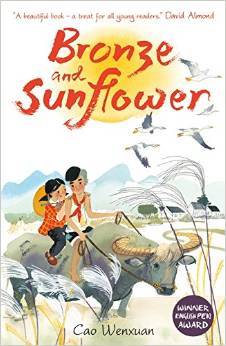 |
| Click to view on Goodreads |
A classic, heartwarming tale set to the backdrop of the Chinese cultural revolution.
(384 pages)
I honestly have no idea how to review Bronze and Sunflower.
I don't know what it is about the book, but I just can't wrap my head around it. I'm actually a little puzzled by the ending, which is still not entirely clear to me even after I've read it a few times. I think that's a translation trouble–in fact, I think a lot of my confusion comes either from translation ambiguousness or cultural differences. Since I know nothing about the Chinese cultural revolution–or indeed about anything in Chinese history, culture, or politics–I have the overwhelming feeling that all sorts of important themes and references are passing right over my head throughout the story.
Because of that, I advise you to take my review with a grain of salt. After all, I'll be the first to admit that I am on very shaky ground here. But anyway, I did enjoy the book. It was very different from my usual fare, rather strange to my American mind (though Chinese readers might find it perfectly normal, I don't know), and very interesting. It felt like a fairytale in many parts, in large part due to its fairly unrealistic characters. Both Bronze and Sunflower seem unrealistically perfect (never squabbling, never selfish, never unpleasant). The levels of sacrifice they're willing to go through for each other makes their relationship very sweet, but also makes both of them ring false to me.
The troubles they face definitely aren't fairytale-like, though. The family is very poor, and they struggle to afford school (eventually deciding to send just Sunflower because, you know, they hadn't thought about the fact that Bronze wouldn't be able to attend school too before they invited her to stay with them). Toward the middle of the story a swarm of locusts comes through and devours everyone's crops, and people begin to starve. Things get really hard, and Wenxuan doesn't pull any punches when he describes what it's like for them.
I may have a few issues with the choices made by the adults throughout the book, but those pale in comparison to the sense of wonder I feel reading a book that was written in an entirely different language from my own, in a world and a culture entirely distinct from mine, and which has given me a peek into the world of Chinese literature. I loved diving into the world of Bronze and Sunflower for a time, as theirs was an engrossing story that provided a fascinating cultural insight for me, but now I'm ready to set it down and return to my usual fare that strikes closer to home. I'l definitely be keeping an eye out for more international novels in the future.
Disclaimer: This is an Amazon affiliate link, and I received a complimentary copy of this novel from the publisher in exchange for an honest review.
I honestly have no idea how to review Bronze and Sunflower.
I don't know what it is about the book, but I just can't wrap my head around it. I'm actually a little puzzled by the ending, which is still not entirely clear to me even after I've read it a few times. I think that's a translation trouble–in fact, I think a lot of my confusion comes either from translation ambiguousness or cultural differences. Since I know nothing about the Chinese cultural revolution–or indeed about anything in Chinese history, culture, or politics–I have the overwhelming feeling that all sorts of important themes and references are passing right over my head throughout the story.
Because of that, I advise you to take my review with a grain of salt. After all, I'll be the first to admit that I am on very shaky ground here. But anyway, I did enjoy the book. It was very different from my usual fare, rather strange to my American mind (though Chinese readers might find it perfectly normal, I don't know), and very interesting. It felt like a fairytale in many parts, in large part due to its fairly unrealistic characters. Both Bronze and Sunflower seem unrealistically perfect (never squabbling, never selfish, never unpleasant). The levels of sacrifice they're willing to go through for each other makes their relationship very sweet, but also makes both of them ring false to me.
The troubles they face definitely aren't fairytale-like, though. The family is very poor, and they struggle to afford school (eventually deciding to send just Sunflower because, you know, they hadn't thought about the fact that Bronze wouldn't be able to attend school too before they invited her to stay with them). Toward the middle of the story a swarm of locusts comes through and devours everyone's crops, and people begin to starve. Things get really hard, and Wenxuan doesn't pull any punches when he describes what it's like for them.
I may have a few issues with the choices made by the adults throughout the book, but those pale in comparison to the sense of wonder I feel reading a book that was written in an entirely different language from my own, in a world and a culture entirely distinct from mine, and which has given me a peek into the world of Chinese literature. I loved diving into the world of Bronze and Sunflower for a time, as theirs was an engrossing story that provided a fascinating cultural insight for me, but now I'm ready to set it down and return to my usual fare that strikes closer to home. I'l definitely be keeping an eye out for more international novels in the future.
Disclaimer: This is an Amazon affiliate link, and I received a complimentary copy of this novel from the publisher in exchange for an honest review.
No comments:
Post a Comment
Join the conversation!